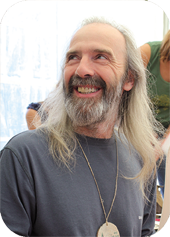Finding out about Permaculture with Aranya
 Arboretum Marbella, the award-winning permaculture project in Andalucia Spain, is holding a Permaculture Design Course from 9th to 22nd of October. Certified by the British Permaculture Association and comprising of 112 hours of theoretical and practical training, this comprehensive course is internationally recognised and necessary for gaining the Diploma in Applied Permaculture. This course is longer and more comprehensive than the international standard and features inspirational, experienced and committed trainers delivering quality content in English and Spanish.
Arboretum Marbella, the award-winning permaculture project in Andalucia Spain, is holding a Permaculture Design Course from 9th to 22nd of October. Certified by the British Permaculture Association and comprising of 112 hours of theoretical and practical training, this comprehensive course is internationally recognised and necessary for gaining the Diploma in Applied Permaculture. This course is longer and more comprehensive than the international standard and features inspirational, experienced and committed trainers delivering quality content in English and Spanish.
One of the fantastic trainers is Aranya, an expert in permaculture, experienced trainer, author and senior tutor for the permaculture diploma and we caught up with him to find out what permaculture means to him.
How did you get into permaculture?
I first met a permaculture designer back in the late 1980s but didn’t have the time to study it until a design course was held in my shared house in 1996. After that I knew it was what I wanted to do as it was full of positive potential. I then spent a year living totally off grid in Eire where I learned how to apply it to my real life situation there.
How do you incorporate it into your daily life?
Once you’ve learned permaculture you see the world in a different way. My ‘permagoggles’ allow me to see the world much more clearly, which can sometimes be really frustrating when I notice how badly many things are done. That said, being able to design my home, garden, livelihood and much more using permaculture design has made my life so much better. In short, I use it for everything I do.
Do you think permaculture can offer us real and viable solutions to current challenges?
Yes, absolutely! Decades of cheap energy have made us so wasteful, allowing us to thoughtlessly replace skill with brute force. In a low energy future we’ll need to become better observers again and permaculture can help us with this. Inspired by nature, it focusses on understanding the relationships in systems so we can identify opportunities and place things where they work best. We don’t lack techniques, just the understanding about where to apply them. Permaculture is a vital skill we can all learn.
What permaculture ´jobs´ do you enjoy doing most?
I use permaculture all the time, but have always loved being out in nature, observing and learning. I love my garden and finding out what else I can grow there. I also love teaching as it brings me into contact with so many amazing like-minded people.
Why would you recommend that somebody studies permaculture?
As I mentioned in question 2, permaculture is a great skill for daily life. Plus it offers so much potential for learning new fascinating and useful things. We can apply permaculture thinking to anything we do and so you’ll never run out of things to be excited about.
During your course, what do you think will be the key things to learn and the most useful for the students?
To slow down and fully take the time to observe the landscape around us. To spend more time in the planning so we need less effort in the doing. Many of us see the problems of the world and want to do something urgently, but if those things aren’t thought through we can just make things worse. Permaculture provides a clear way for us to make good choices, wherever we are.
In just three words, what does this PDC course offer its participants.
Exciting new possibilities.
To find out more about Aranya and buy a copy of his book Permaculture Design a Step by Step Guide visit his website
Aboretum’s course is for anyone who has the ambition to change their lives and their surroundings through a learning experience that will lead to a personal transformation and an internationally recognised qualification. It provides theoretical and practical learning and a dynamic and active approach. Students will have the opportunity to work collaboratively in small groups led by well-respected professionals in permaculture. With a big emphasis on real case studies, students will leave the course with the tools to allow them to become a changing force in society.
Three options are available, a Permaculture Design Module (40 hours), a basic programme (72 hours) and the full course (112 hours) and prices start from €270. Bookings can be made online at www.arboretumpdc.org.


